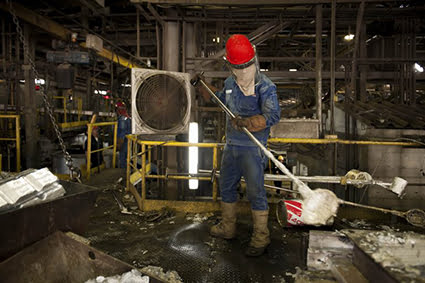CALLUM Ford, National Marketing Manager at Lubrication Engineers (LE) South Africa, says there are a range of sustainability considerations when it comes to lubrication and even lubrication cleaning schedules.
“LE offers a range of products and services specifically designed to help organisations who are looking to embed sustainability into their business strategy at every level,” he says. “Not only have we focused on developing oils and greases that will help our customers to improve their energy and fuel efficiency, we’ve also worked to create eco-wise products that are better for the environment. Our solutions can help to reduce energy use, cut emissions (through improved efficiency) and protect the environment. This can help mines and other large-scale organisations to meet their ESG targets.”
LE’s Earthwise range offers non-toxic products designed for specific environmental needs. For example, Earthwise EAL Wire Rope Grease (3353) is a certified environmentally acceptable lubricant recommended for use in applications on or near waterways. It is readily biodegradable, exhibits minimal aquatic toxicity and will not accumulate in the cells of fish and other aquatic life forms.
LE also offers eco-wise solutions to help deal with lubrication spills and cleaning requirements. “Oil spills can kill microscopic organisms, damaging entire food chains, and causing real environmental damage. We offer an incredible solution to help with oil spill, called Oil Spill Eater II (OSE II). It was developed in 1989 in the USA and has been used to clean up more than 44 000 spills since. It’s approved by the US Environmental Protection Agency and the UK Marine Management Organisation. It uses a biological enzyme to convert waste into a natural food source for bacteria found in aquatic environments. Unlike other supposed bioremediation oil clean-up techniques, OSE II is not a bacterium, a fertilizer or dispersant product.”
As far as LE has been able to ascertain, OSE II is the world’s most environmentally safe and cost-effective bioremediation process for the mitigation of hazardous waste, spills and contamination virtually anywhere of any size, large or small. Essentially, OSE II contains nutrients that attract indigenous bacteria. These then rapidly multiply, which speeds up the natural spill remediation process as the bacteria release enzymes and biosurfactants that attack the spill. The biosurfactants emulsify the spill, breaking it down to be used as a food source for the bacteria, with the end products being CO2 and water. OSE II can bioremediate most organic-based compounds and almost all hydrogen-based compounds.
Ford says that LE, which has ISO9001 certification for cleanliness, is also able to assist companies with setting up complete lubrication reliability cycles that address issues like safe lubricant storage and application (minimising cross-contamination and spills), and top-performing lubrication products and additives (to improve efficiency and minimise wastage).
